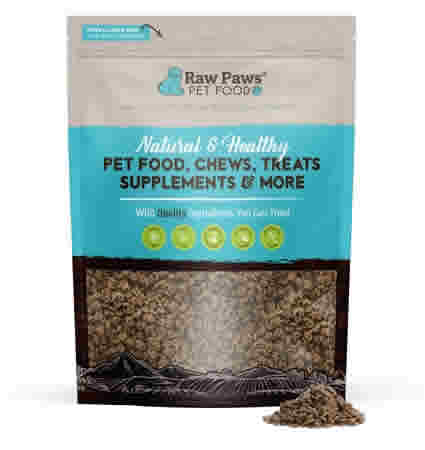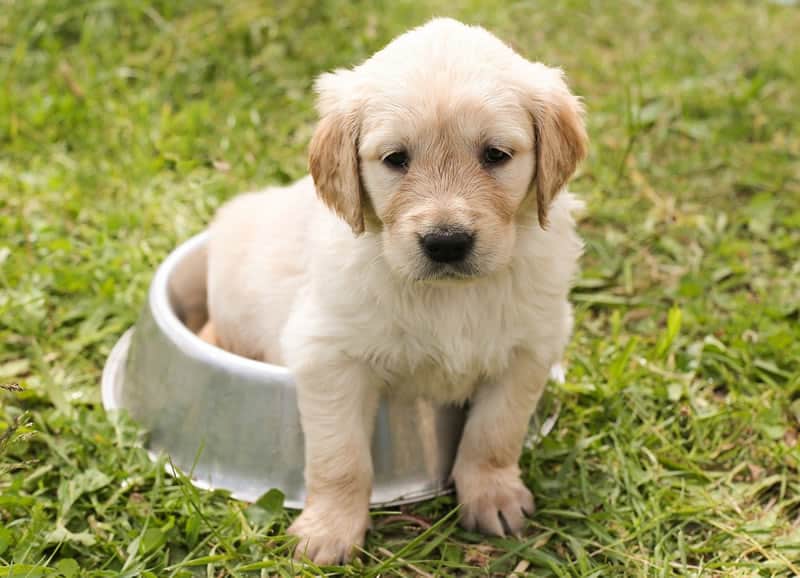Dealing with a puppy that has a sensitive tummy is never easy and it’s also never easy to find a dog food that works for your fur baby. There are a huge amount of options and this can be overwhelming at the best of times.
Our top choice for your puppy with a sensitive tummy is a Premium Chicken Kibble produced in the USA from an American-owned company, Raw Paws Pet Food. It is a complete balanced meal for optimal digestive health and contains all essential nutrients to ensure your puppy’s health and vitality. A detailed description of this kibble can be found below.
.
What is A Sensitive Stomach
We often hear that a dog or even a person has a sensitive stomach, however, what does that mean?
It basically means that your dog’s stomach is upset due to a sensitivity to certain food or foods. With a sensitive stomach, there are some warning signs to look out for.
.
Signs Of A Sensitive Stomach
The following are normally the classic signs of your dog having a sensitive stomach. However, if your dog is displaying any of these signs it’s always important to check with your veterinarian in case there is some other underlying issue.
1. Loose Stools
Most dogs have loose stools at some stage in their lives. It can be quite common for a puppy to have a loose stool, however, if it becomes increasingly regular and you begin to notice a pattern then your pup may have a sensitive stomach.
2. Vomit
The occasional vomit is not unusual, however, similar to loose stools if it becomes a regular occurrence it could be a sign of sensitivity.
Sometimes dogs or puppies can vomit if they gulp down their food too quickly. There are slow feeder bowls which help with this issue
3. Gas
This can come in two ways – flatulence and belching. Again the occasional release of wind by your dog or puppy is quite normal. I once had a dog who used to look around when he farted as if to say who just did that. Belching can occur if your dog gulps his food down in a few bites and just like vomiting a slow feeder bowl could help with this problem.
3. Diarrhea
If your dog has frequent bouts of diarrhea after consuming his food then it’s time to take notice and consult with your veterinarian. Sometimes there can be signs of blood in the stool.
5. Less Active Puppy
Sometimes a puppy with a sensitive stomach will be less active. This is quite understandable. Place yourself in your pup’s situation. If you just had a bout of diarrhea you wouldn’t feel like playing or jumping around and would prefer just to stay calm and quiet until you are feeling better.
What Causes A Sensitive Puppy Stomach?
Your puppy is eating something that causes this upset so you will need to do some investigative work and find out what is causing your puppy to have a sensitive stomach. Puppies can get up to all kinds of mischief and that includes scavenging for food in all sorts of places from trash cans to backyards.
Make sure that all food waste is puppy proof. Normally the food that causes the problem is a protein-based source.
The most common source of protein that is most likely to causes problems can be found in beef, chicken, eggs, and dairy. Protein can also be found in wheat, barley, and rye and it is called “gluten.” You may be familiar with gluten-free options for both humans and dogs.

How To Help Your Puppy With A Sensitive Stomach
1. Process of Elimination
The first step is to conduct a process of elimination and cut out all treats and table scraps and just feed your puppy his normal food for several days to a week. If the symptoms are no longer present after a few days then you know that it is not the dog food that is causing the problem but the table scraps and/or treats.
However, if the issue is still unresolved then it is a matter of closely examining the ingredients of your current dog food as you will need to find out the root cause.
2. Examine The Dog Food Ingredients
If your dog is now only eating his dog food with no scraps or treats and the issue is still unresolved then it is a matter of closing examining the dog food ingredients.
With pet food ingredients they are listed in the order of the heaviest weight first before they are cooked.
(i) What’s The Main First Ingredient?
When you look at the ingredient list it will show you the first main ingredient.
It’s best to look out for single meat as the main ingredient. If it says chicken meal then you know that chicken is the main source of protein. If it says meat meal then this could be a combination of different meats and the quality would not be as good and may not be suitable for a sensitive stomach.
(ii) Is it Whole Meal or Whole Meat?
When you look at the ingredients on the dog food label you would naturally think that anything whole meat would be of better quality with more protein than say Chicken meal. However, this is not the case. Whole chicken contains around 70% water and 18% protein whereas chicken meal contains approx 10% water and 65% protein.
Source: Bullymax
Whole meal is basically whole meat that has been cooked, dried, and at the end of this process called rendering you have a very concentrated protein powder. However, not all whole meals are of high quality. It all depends on the quality of the whole meat to being with.
Some brands of whole meal are really high quality providing your dog with a nutritious source of protein
While some other whole meals are of low quality and are mainly composed of byproducts, organs, and waste materials from hooves to animal heads. They would normally have the words “by-product” in their description or the words “bone” so best to avoid these types of meals.
What you need to look for in the description is Beef meal, chicken, lamb meal, etc
(iii) Whole Grains or Refined Grains?
Whole grains are the best and healthiest kind of grain and they contain the whole grain kernel – bran, germ, and endosperm. They are packed full of fiber and good nutrients such as Vitamin B, iron, selenium, potassium, and magnesium. They give your dog that full feeling after a meal and so can help maintain your dog’s healthy body weight.
Whole grains include brown rice, barley, and oats.
Unfortunately, many dog owners avoid grains altogether and go for grain-free dog food. Now unless your dog is gluten intolerant or has
Refined grains are milled which results in a finer texture and extends the shelf life, however, it also removes the bran and germ and consequently a lot of the good nutrients.
Refined grains include white rice, white bread, and ccc
(iv) Are There Added Vitamins & Minerals?
When food is cooked it often eliminates important nutrients vitamins and minerals. These important vitamins and minerals can be added back in to help maintain a healthy body for your dog.
– Vitamin A
The most well-known benefit of this vitamin is good eyesight. It is a fat-soluble vitamin and also helps with your dog’s growth and immune system.
– Vitamin B
They are a group of vitamin Bs that your dog requires to maintain a healthy disposition
They include Vitamin B12, B6, and Folic Acid.
– Vitamin C
This is a powerful antioxidant and helps fight against free radicals. These radicals can cause damage to the body’s cellular structure and DNA and impair cognitive abilities.
– Vitamin D
This vitamin is also known as the sunshine vitamin is great for healthy bone growth as it helps balance minerals like phosphorus and calcium.
– Vitamin K
This vitamin helps with the ability of the blood to clot. This is very important as otherwise if your dog had a cut it may not be able to clot and the cut would continue to bleed leading to a severe medical condition.
Source: AKC
(v) Are There Any Artificial Preservatives or Colors?
When choosing a new dog food it is important to carefully examine all the ingredients.
Here you need to be looking out for artificial flavors, preservatives, and colors. If you spot these on the ingredient list then you know that the dog food is not the highest quality and would not be recommended for a dog with a sensitive stomach.
Many of the cheaper lower quality dog foods have preservatives or color enhancers. The main reason they use these preservatives is so that the shelf life of the product can be extended and to stop the fats from going rancid.
Many of these preservatives are not good for any dogs and the main ones to avoid include the following
- Butylated Hydroxyanisole (BHA) – linked to cancer
- Butylated Hydroxytoluene (BHT) – linked to cancer
- Ethoxyquin – Banned in Australia and the European Union as links to tumors in the stomach and colon
- Propylene Glycol (PG) – linked to liver problems
- Tertiary Butylhydroquinone (TBHQ) – linked to allergies & cancer.
Source: petmd
3. Switch To Dog Food With Limited Ingredients
After the process of elimination, you can try another dog food. It would be best to try one with limited ingredients. Too many ingredients will make it difficult to ascertain what causes the sensitivity in the first place.
Try a different protein source (meat) to the one you are currently using. Also, look at changing the carbohydrate source say from rice to potatoes. Look at the fat content and switch to a lower one.
You will need to introduce this new food slowly over a week as otherwise, it could cause even more stomach issues for your puppy. Each day you can add a little of the new food to the old food until your puppy is fully transitioned to the new food. Keep a close eye on your puppy to see how this new food is working. Are there fewer bouts of diarrhea or loose stool? Is your puppy more active and alert?
It can be a slow process and will take plenty of patience but worth it in the end for a happy and healthy puppy.
Stick with this food for several days to a week. Don’t mix dog foods as you will need to know exactly what your pup is eating that causes the problem and if you introduce a lot of foods at the same time then it will be impossible to determine the cause.

Homemade Dog Treats For Sensitive Stomach
There is always the option to make your own dog treats if your dog suffers from a sensitive stomach. Many of the commercial treats sold contain sweeteners and preservatives and sometimes color enhancers.
With homemade dog treats, you can completely control the ingredients and it’s not rocket science to make them. There are tons of recipes online. Here is one very basic and simple recipe for tasty beef/turkey treats.
Remember no salt, sugars, spices, or any additives are required
.
Plain Beef/Turkey Treats
If you know your dog is not sensitive to beef or turkey then this type of treat will go down well with your furry pal.
Purchase mince meat or ground turkey.
Then make mince meat or turkey ground meat into small bite-sized little balls or lumps.
Place them in the oven and bake until all the fat has gone and that they feel completely dry
This can take an hour or two.
When dry and cooled place them in a bag and leave them in the fridge to keep them fresh.
Then use the treats as needed.
WikiHow provides great recipes for tasty homemade treats your dog will love and one good recipe is the Cinnamon Dog Biscuits.
Best Puppy Food For Sensitive Stomach |
Premium Chicken Kibble for Puppies
This premium chicken kibble from Raw Paws Pet Food is our choice for puppies with sensitive stomachs. It comes in a sealable 5lb bag.

Complete Balanced Meal
This American company, Raw Paws Pet Food is located in IN, USA, and has produced this premium kibble in accordance with AAFCO and it is a complete and balanced meal for your puppy.
The ingredients have been formulated to help your puppy grow healthy and strong as they contain the right amounts of fat, protein, and essential nutrients
Optimizes Digestive Health
Probiotics and natural prebiotic fiber are added to the kibble and this will help improve digestive health.
Within your puppy’s gastrointestinal tract you will find active live cultures and Raw Paws adds these cultures to the food under strict human-grade standards.
Added DHA & Omega Fatty Acids
You may see DHA that has been added to milk, well Raw Paws adds DHA to its kibble along with omega fatty acids. These have been shown in many scientific studies to support the heart, brain, and eyes in every stage of development. This will help your puppy grow into a healthy and active young adult dog.
Contains Whole Foods
This high protein premium kibble also contains whole foods such as apples, beets, carrots, cranberries, and even dried kelp.
All these nutrients will enhance your puppy’s health and vitality.
Suitable For All
This kibble is suitable for small, medium, and large breed puppies. It also is suitable for pregnant and nursing adult dogs.








